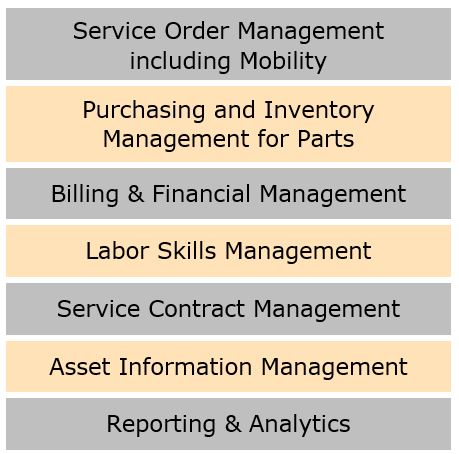

Field Service Management (FSM) systems are used by a service provider to manage the maintenance of physical assets that are geographically widely dispersed either on their customers’ sites (as with an OEM or services company), or its own assets (as with power T&D).

Since field service involves widely distributed assets, it requires features like integrated maps, route optimization, in-vehicle parts inventory management, and customer billing. FSM solutions are typically designed for use by third parties that provide maintenance services to asset owner-operators. FSM systems plan, optimize, execute, and track the needed service activities with the associated priorities, skills, materials, tools, and information. For FSM, financial management extends into order management that includes credit approval, order entry, and billing for services delivered.
Service Order Management: involves the work performed by the field service organization. This includes work order creation, planning, scheduling, schedule optimization, execution, documentation, and tracking of activities. Here, mobility provides a means for technicians to process their work orders while they are doing the work at the asset’s location. Since the technician goes to locations beyond the range of the wireless network, the mobility solution needs store data when out of range and synchronization when returning.

Purchasing and inventory management applies to parts management so they are available when a work order is released to a technician. Some users integrate their FSM systems with ERP systems for the purchasing, inventory management, and related accounting activities.
For billing and financial management, the FSM system tracks work order completion and the specific services provided so clients are accurately invoiced for the services provided.
Labor skills management includes needs assessment, training, and certification of labor resources including both internal employees and contracted individuals. This helps ensure assigning the appropriate labor skills to work order. For example, a certified electrician is assigned to electrical service calls and a plumber to those involving plumbing. Sometimes skills management is in the enterprise HR application, and integrated with FSM systems.
Service contract management includes managing bids for jobs, proposal generation, metric tracking, contract management, authorization, reconciliation, settlements, warranties, billing, payments, back charges, performance measures, and restrictions. The management of the terms and conditions of specific contracts is also included. Some of these functions can be available through integration with the service organization’s CRM system.
Machinery manufacturers are embracing IIoT and analytics to provide new post-sales services and high-margin revenue growth for predictive maintenance. This service can be an email alert that goes to the end-user prior to unplanned downtime. Now, many OEMs are expanding these services to include sending service technician to execute the repair. OEMs are rapidly adopting FSM solutions to assure that the promise of near zero unplanned downtime is achieved and protect its brand.
For more trends, go to: Industrial IoT Transforms FSM
This market research study provides current market analysis plus a five-year market and technology forecast. ARC derives market size and share from its extensive in-house databases and in-depth interviews with leading suppliers. The FSM market study may be purchased as an Excel workbook and/or as a PDF file.
This technology selection guide is designed to help organizations navigate the buying process for FSM systems. ARC determines selection criteria through research with users and an understanding of supplier capabilities. The FSM guide includes both selection criteria and strategies for choosing the best field service management software supplier to meet your business needs.

